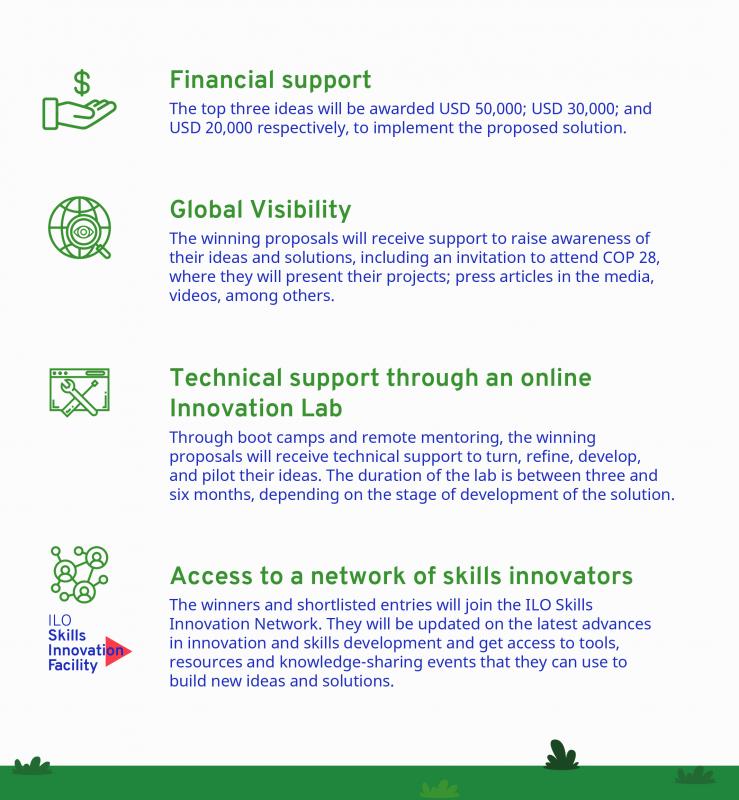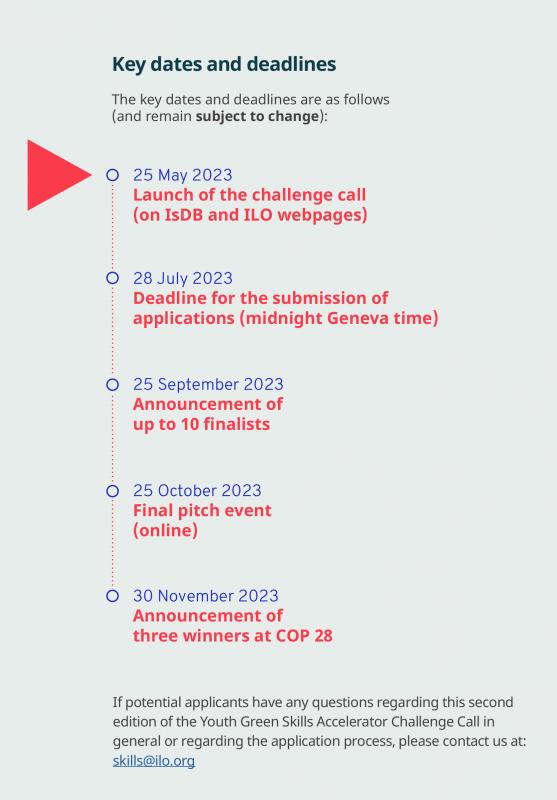IsDB-ILO Youth Green Skills Accelerator Challenge Call 2023
Once again, the International Labour Organization (ILO) and Islamic Development Bank (IsDB) are now inviting youth-led not-for-profit organizations to propose new and innovative green ideas and solutions that will support training processes for young people living in post-crisis situations.
To assist young people in further translating their activism, commitment and creativity into action, the Islamic Development Bank (IsDB) and the International Labour Organization (ILO) have designed the “IsDB-ILO Green Skills Accelerator Challenge Call”, with the overarching goal of promoting youth participation and skills for green jobs for a just transition.
In 2022, the Islamic Development Bank (IsDB) and the International Labour Organization (ILO) designed the IsDB-ILO Youth Green Skills Accelerator Challenge Call to recognize, promote and assist young people in further translating their activism, commitment, and creativity into action regarding the climate change action and the shift to a green economy.

The two institutions have joined forces again this year to renew the experience by adding a focus on post-crisis environments. Since the covid-19 crisis is finally dissipating, the world has been quickly entangled in a new set of crises. Given that crises have direct and long-lasting impacts on the world of work: post-crisis environments are often characterized by important labour surplus, significant changes in labour market demand, as well as important disruptions in education and training.
In this regard, the scope of this year’s challenge call – “From Crises to Resilience: Empowering Youth for a Greener Future” – seeks to identify skilling solutions for post-crisis situations to build back better and greener. Proposed solutions should be reaching out effectively to individuals whose lives have been affected by crises with upskilling programmes adapted to their needs, which will allow them to re-engage effectively in local labour markets, reconnect with their communities, and improve their resilience.
The solutions should also be an opportunity to build back not only better but also greener. Transitioning towards environmental sustainability can potentially create millions of jobs globally. A Just Transition towards an environmentally sustainable economy requires reskilling and upskilling of workers to reduce the risk of rising unemployment, poverty, and inequality. This is particularly true in a post-crisis situation.
In line with the first edition of the Youth Green Skills Accelerator Challenge Call, the objective of this year’s second edition is to identify, incubate, test, and disseminate innovative solutions in IsDB-ILO common member states. The IsDB-ILO Challenge Call will leverage the infrastructure and experience of the ILO Skills Innovation Facility, and seeks to achieve the following goals:
- RECOGNISE the key role that young people play as agents of change to accelerate action towards a just transition, especially in crisis contexts.
- ENHANCE young people’s capabilities by offering the knowledge and skills they will need in a greener post-crisis economy.
- ACCELERATE innovation around youth employment and green skills in crisis contexts by providing innovators with a network of experts from IsDB and ILO to support and implement their ideas and solutions.
What are we looking for?
The IsDB and ILO, in this second edition of the Youth Green Skills Accelerator Challenge Call, are looking for not-for-profit education and training providers (including public TVET institutions and youth-led organizations) that support training for young people (15-35 years old) living in IsDB-ILO common member states and the occupied Palestinian territories. They should focus on green skills development and training support in post-crisis situations for:
- Young people to be entering or re-entering education or the local labour market.
- Promoting social cohesion and peaceful co-existence at the local level.
- Building back greener in post-crisis countries/settings.
- Enhancing countries’/communities’ social and economic resilience.
All proposals should be, as appropriate given local circumstances and the crisis context, in line with the following main recommendations concerning Education, Vocational Training and Guidance (Chapter VI, Articles 18 to 20) on Employment and Decent Work for Peace and Resilience Recommendation, 2017 (No. 205 ):
- Ensuring education and training continuity.
- Establishing programmes that respond to emerging skills needs for recovery and reconstruction.
- Organizing re-entry in education and training, adapting, and extending these programmes to fit the learners’ needs, and establishing second-chance education and training opportunities.
- Giving special attention to the training and economic empowerment of affected populations, displaced populations, those in rural areas and the informal economy.
- Ensuring women and girls can access education and training based on equal opportunity and treatment.
- Adapting learning to promote peaceful co-existence and reconciliation.
- Mainstreaming disaster risk education, reduction, awareness and management in education and training.
For more details, please refer to the Participants Guidelines (English ) (Arabic ).
Which organizations can apply?
The applicant must meet the following criteria:
- Legally registered not-for-profit organizations – these can include government agencies, employers’ and workers’ organizations, cooperatives, education, and training institutions (including public TVET institutions, schools, training providers, and universities), NGOs and civil society organizations, and other educational and research institutions.
- The applicant must be registered in an IsDB-ILO common member state or the occupied Palestinian territories.
- The applicant will be required to submit proof of their legal registration.
- The applicant must have the contractual capacity and have been in existence for at least two calendar years before the deadline of the submission for applications.
- The applicant must provide a detailed budget and indicate a contribution from the proposing organization corresponding to at least 10 per cent of the value of the proposal, which can be represented by in-kind or staff costs.
- The solution answers one or more of the questions of the challenge listed under the “target scope” (see section 3 of the Participants Guidelines ENG / AR ).
- All submissions must be made in English or Arabic.
The IsDB and ILO reserve the right to carry out reasonable due diligence, including contacting references provided and other third parties to confirm the eligibility of participants, and may refuse to award the grant to a participant if there is suspicion of any irregularity, fraudulent activities, etc.
How to apply?
The application process comprises two rounds:
1st Application round
Applicants should:
- Review the eligibility criteria for participation in the challenge call, selection criteria for assessments, and the Terms and Conditions applicable to ILO Implementation Agreements specified in these Participants’ Guidelines.
- Fill in the Application Form (English ) (Arabic ) and submit it by 28 July 2023 (midnight Geneva time). Before preparing the Application Form, please look at the list of Application Questions (English ) (Arabic ). We recommend preparing your application information and answers first using this list, as the online application form does not allow saving an application before submission. Also, please prepare a budget estimate using the Budget Template (English ) (Arabic ) and submit it on the Application Form.
Applications can be submitted in English or Arabic. Only the applications selected for the second application round will be contacted. No fee is required to participate in the challenge call. Late or incomplete applications will not be accepted.
2nd Application round
If your application is among the top 10 applications submitted, the applicant will be requested to submit an extended project proposal and will be invited to pitch their project proposal at a final online pitch event.
Prizes and benefits

Key dates and deadlines
